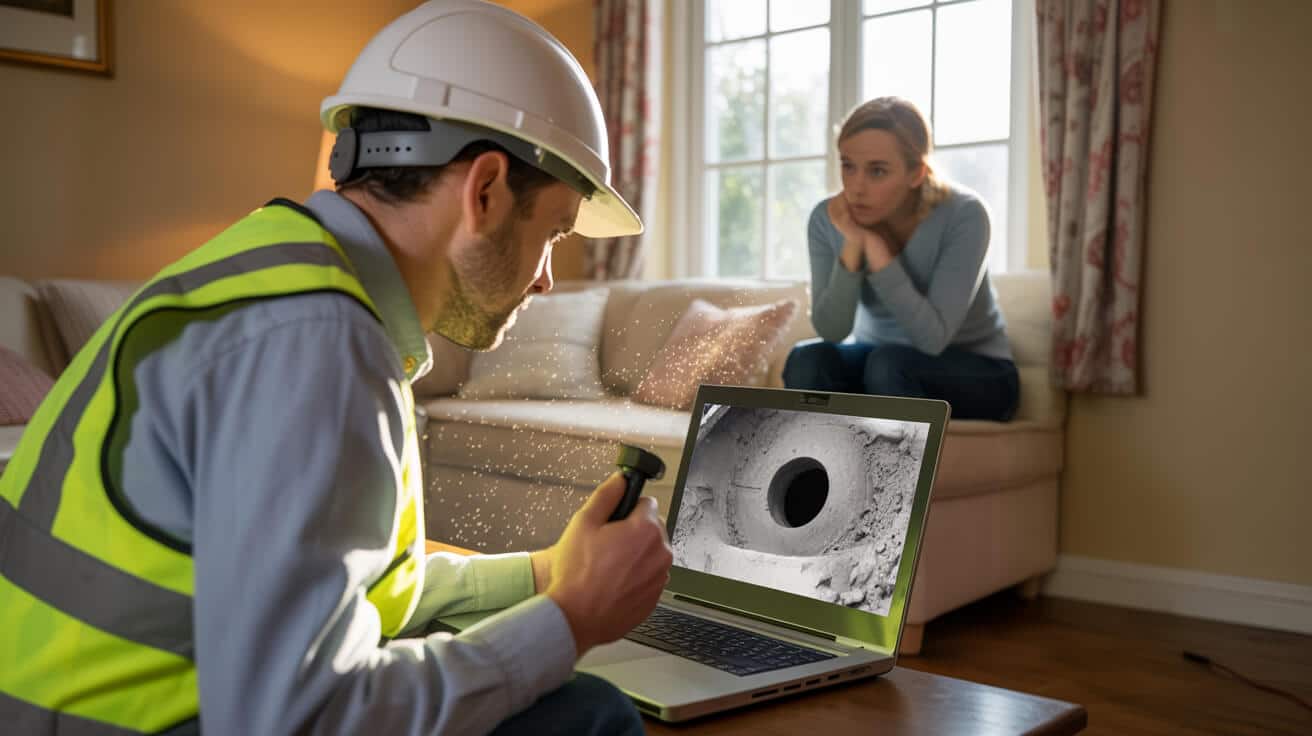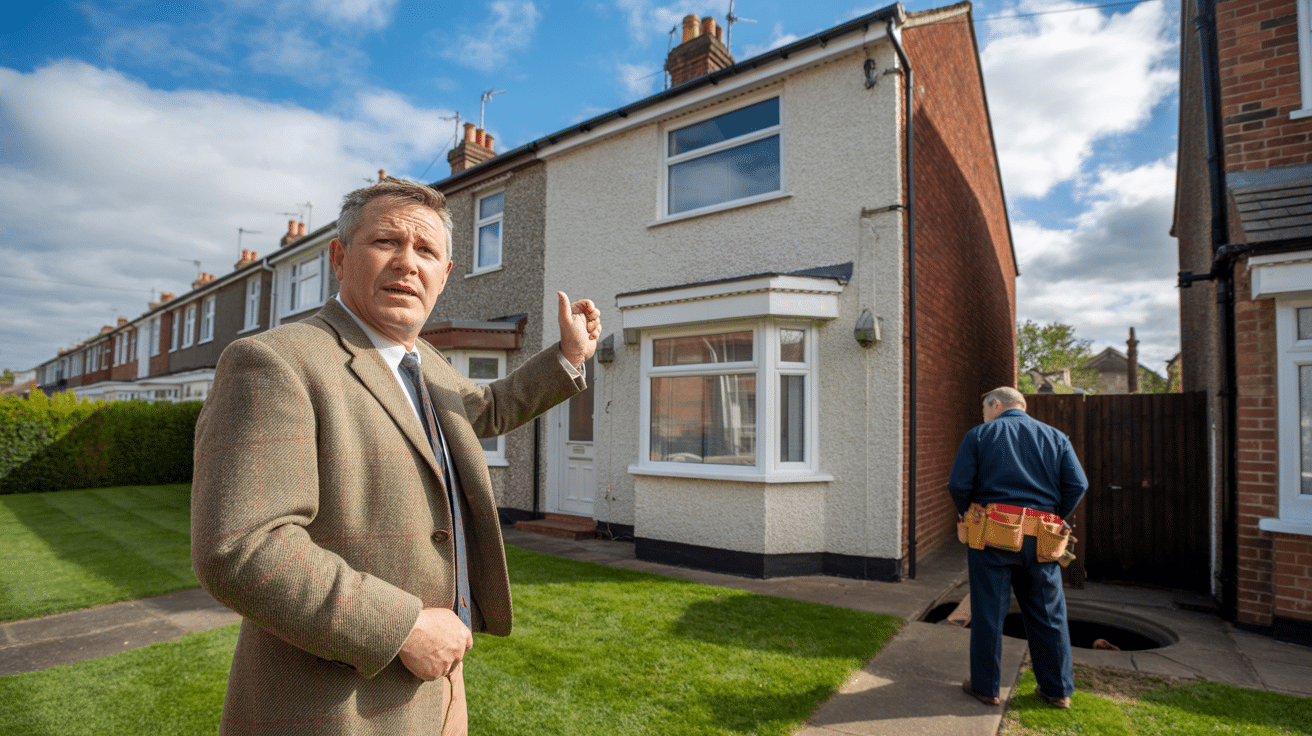 Landlord Obligations Gas Safety Checks in 2025
Landlord Obligations Gas Safety Checks in 2025

Why Gas Safety Is Now Every Landlord’s Weak Point for 2025
For years, gas safety was a tick-box—a line on your compliance calendar, handled and forgotten. In 2025, that mentality is the risk. Every week, landlords lose lets, face council stop orders, or wind up wrestling with insurance refusals not because they forgot the gas, but because they treated it as routine. The law, the tech, and the tenants have moved on. If your system hasn’t, exposure is now built in.
One missed record and your next let can be frozen, your insurance voided, and your agent’s digital portal flagging your property as do not list.
What’s changed? For the first time, gas safety compliance is real-time and digital-first. Inspections now mean more than booking the annual boiler check—cloud-based records, live CO alarm demos, hydrogen-ready upgrades, and digital proof for every major and minor appliance are mandated. Agents, tenants, brokers, and councils can all demand inspection data or CO proof at any moment, no warning. Paper folders and phone photos don’t cut it. The price for “I’ll upload it later” is a letting delay you can’t budget for—or even a Section 21 block.
Old routines—last minute calls, missing appliance logs, trust in paperwork with no digital trail—are the new compliance trap. Landlords resistant to change find their business pauses: insurance fails to activate, mortgage providers ask awkward questions, and tenants move onto other properties while you chase a lost certificate. Only landlords who systemise, digitise, and evidence their gas safety in 2025 will truly protect their letting income.
This is no longer about passing inspection—it’s about letting, earning, and safeguarding your reputation. We’ll break down every key shift for 2025, why your duty now runs to the cloud, what smart compliance looks like in practice, and exactly how Plumbers 4U helps landlords stay stress-free, audit-ready, and let-ready all year round.
What Does Your Legal Gas Safety Duty Really Cover as a Landlord?

Landlord gas safety law runs deeper than an annual CP12. If you own or manage rental property, your duty is “audit-ready, at all times, for everything supplied.” That doesn’t just mean an inspection—every gas appliance and flue you provide must be checked, logged, and demonstrated safe, every year, without fail. It means an engineer with the right card, proper paperwork, and time-stamped, digitally stored evidence ready to pull up on request.
The “old system” of physical folders and end-of-year panic is obsolete:
- Every gas boiler, hob, fire, oven, and even capped-off supply you’ve installed is your responsibility for annual checking and record-keeping ([HSE](https://www.hse.gov.uk/gas/domestic/faqlandlord.htm)).
- Gas Safe is non-negotiable—using “a mate who’s handy” means your certificate is void, your insurance is likely invalid, and you incur heavy penalties ([Gas Safe Register](https://www.gassaferegister.co.uk/find-an-engineer/)).
- Proof is needed for all tenancies—new, current, even for properties between lets. Any party (tenant, agent, insurance, council) can ask, and a missing record means instant non-compliance.
- Digital records matter as much as the inspection itself. Location, engineer ID, and clear test logs must be available instantly, not “after the weekend” ([Wikipedia](https://en.wikipedia.org/wiki/Landlord%27s_gas_safety_certificate)).
CP12s are now digital, covering every device, tracked with a time stamp—property folders don’t pass muster.
This law covers everyone—from the single flat owner to landlords with 100+ units. letting agents use audit portals with zero tolerance for missing data. Councils and mortgage lenders increasingly cross-check records against Gas Safe digital registers. If your evidence is inaccessible or out of date, your let, cover, or even right to operate can be paused on the spot.
Landlords who see compliance as “my asset, not my headache” now handle all this digitally—no last-minute stress, just clear, instant proof.
Isn’t the Annual Inspection Still Just the Boiler? What the Law Expects Now

The law in 2025 doesn’t ask “Is your boiler checked?” It asks, “Is every gas appliance you provide—and every flue and pipe—accounted for, and proven safe?” Boiler-only checks or “that fire’s capped-off, don’t worry” no longer fly. Agents and councils expect comprehensive, logged, and retrievable proof for everything you own in the property.
A full, passable gas safety inspection requires:
- Complete coverage: All supplied boilers, cookers, hobs, fires, exposed pipe runs, capped-off lines, and every flue—old or new ([Hometree](https://www.hometree.co.uk/guides/gas-safety/landlord-gas-safety-certificate-explained.html)).
- Leak test, combustion checks, flue checks, pressure tests, and functional demonstrations for each appliance and run.
- Engineers to log control-checks, carbon monoxide tests, fault notes, and tenant notifications, with every detail matched to the property and date.
- Un-safe, faulty or obsolete appliances must be reported, shutdown, and logged—with engineer’s warning passed to tenant and landlord. You must act or face non-compliance risk.
- Early inspections are permitted: book up to two months before expiry, so your portfolio can rotate through checks without risk of lapsed cover ([HSE](https://www.hse.gov.uk/gas/domestic/faqlandlord.htm)).
- Best outcomes come from two years of evidence (or more) for each device, including notes, service work and emergencies.
Shortcutting is high-risk. The most common cause of failed lets? The second hob, unused gas fire, or side kitchen over whose log is “just out of date.” Every appliance and capped supply counts. Miss one, and your compliance is incomplete—a red flag for every letting.
No tenant or agent wants a just enough check. Full system care is what fast-tracks lets, keeps renewal fees low, and builds landlord reputation you can actually see.
What’s Changed for Landlords in Gas Safety Law for 2025?

2025 resets the bar: not just higher, but fundamentally different. The law and best practice both undergo their biggest shift in a decade, with a sharp focus on futureproofing, decarbonisation, and digital traceability.
- Only hydrogen-ready, 92%+ ErP boilers are allowed for new instals or replacements—every swap after January must meet this bar ([GasGo](https://gas-go.uk/blogs/gas-safety-information-and-tips/2025-uk-gas-safety-regulation-changes-what-homeowners-landlords-need-to-know)).
- Manual controls are out. All new systems require smart controls (Nest, Hive, Tado, etc.) with proof of setup and live operation for every let ([GasGo](https://gas-go.uk/blogs/gas-safety-information-and-tips/2025-uk-gas-safety-regulation-changes-what-homeowners-landlords-need-to-know)).
- Every gas-using room demands a carbon monoxide alarm—tested, logged, and photo-evidenced on cloud or CRM, updated every year ([HSE](https://www.hse.gov.uk/gas/domestic/faqlandlord.htm)).
- All upgrades (boiler, stat, alarm) carry a digital “benchmark”—engineer photos, expiry tags, and live notes are the new standard for compliance, not an afterthought.
- Failure to meet these standards means costly rework, notices from local authorities, loss of EPC or grant status, and delays or blocks on letting.
Your letting speed, insurance, and EPC are now a direct function of how fast you update to compliant (read: hydrogen-ready, smart-controlled, CO-proven) systems.
Those who treat these new rules as an “add-on” are already falling behind. Landlords who move early enjoy peace of mind, uninterrupted let income, and keep their portfolio competitive as tenants and agents vet properties for futureproof appliances and proven digital compliance. Delaying, cutting corners, or “just tidying up before inspection” now leads to double costs—a compliance gap followed by penalty fixes.
What Does “Audit-Ready” Digital Gas Safety Mean in 2025?

Audit-ready means “Proof—now.” The new standard is no ambiguity, no lag, no folder-hunting. Whether you manage one let or a century-old block, the expectation is digital-first records, instantly accessible or sendable to agents, tenants, insurers, lenders, or council.
To be truly audit-ready in 2025:
- Provide digital CP12 documentation to tenants within 28 days of the check (and always before move-in or renewal) ([HSE](https://www.hse.gov.uk/gas/domestic/faqlandlord.htm)).
- Store everything—certificates, engineer IDs, test logs, photos—in a secure, cloud-based system or landlord/agent CRM ([GasGo](https://gas-go.uk/blogs/gas-safety-information-and-tips/2025-uk-gas-safety-regulation-changes-what-homeowners-landlords-need-to-know)).
- Link every log and record to the exact property, date, appliance, and qualified engineer by name and ID number.
- Retain records for at least two (ideally three) years—and don’t let a single log, replacement control, or CO alarm check go unlogged.
If you can’t find and supply a log instantly, that’s already a fail. “Audit-ready” means no paperwork panic, no searching your van inbox, and no “check later” notes. Councils, insurers, and agents have already shifted to digital uploads and expect landlord partners to do the same.
The standard isn’t good enough to let; it’s good enough to pass a digital spot-check from any direction.
The fastest-growing letting businesses and portfolio landlords now pick engineers and firms (like Plumbers 4U) who deliver cloud documents, reminder setups, and self-service dashboards with every appointment—every letting becomes seamless, proactive, and proof-first.
How Do CO Alarms and Smart Controls Impact Gas Safety, Lettings, and Insurance?

From 2025, CO alarms and smart controls aren’t extras—they’re what makes or breaks a legal let. “Proof—not promise” is the mantra: If you can’t show a tested alarm or operational smart heating setup, your tenancy risks a block even with a passed boiler check.
What the law expects, and how it affects your bottom line:
- Every gas-using room must have a CO alarm, dated, tested yearly, and recorded with a log or photo ([HSE](https://www.hse.gov.uk/gas/domestic/faqlandlord.htm)).
- Landlords must supply visible (often photo or video) proof that the alarm is live and sound-tested at tenant handover ([GasGo](https://gas-go.uk/blogs/gas-safety-information-and-tips/2025-uk-gas-safety-regulation-changes-what-homeowners-landlords-need-to-know)).
- Smart controls—Hive, Nest, Tado, etc.—are now required for every new or updated heating system. You must hand over login/setup details, not just “it’s on the wall”.
- Lettings increasingly hang on the presence—and working evidence—of both. Missing a working CO alarm or not being able to demo the control is enough to cause an agent to block a letting, insurers reject a claim, and councils freeze a new tenancy.
A lack of photo evidence after instal, missing demo at handover, or a two-year-old alarm with no test log can now break a contract. For many landlords, it isn’t about the law anymore—it’s about letting without interruption, fielding zero paperwork calls, and keeping reputation (and renewal rates) high.
Paper checklists are the new weak point. If there’s no proof an alarm works and a stat is programmed for the tenant, you’re exposed.
Partnering with engineers and compliance services who see this as standard—delivering photo logs, digital record scheduling, and live demonstrations every time—removes the last points of friction from modern gas safety.
What Are the Silent Pitfalls That Cause Landlord Gas Safety Failures?

Landlord gas safety failures don’t usually involve a big drama—they’re silent, slow accumulations of small oversights that become real, expensive headaches. In 2025, the most common risks are invisible until the letting, insurance, or council deadline comes up—and by then, the cost means delayed income, hassle, and sometimes loss of licence.
Examples of silent hazards:
- Delayed CP12 renewals—even a day late can now void cover and stop a let, regardless of intent.
- “Like-for-like” boiler swaps or controls that ignore the hydrogen-ready and smart upgrade requirements—forcing you to pay for extra works and run the risk of non-compliance ([GasGo](https://gas-go.uk/blogs/gas-safety-information-and-tips/2025-uk-gas-safety-regulation-changes-what-homeowners-landlords-need-to-know)).
- Logs that aren’t backed-up or cloud-stored—if you can’t produce a test result instantly, the check might as well never have happened ([Wikipedia](https://en.wikipedia.org/wiki/Landlord%27s_gas_safety_certificate)).
- Forgotten rooms, capped pipes, or old appliances never added to the check—these routinely trigger letting refusals, agent queries, and local authority notices.
- “It’s just admin”—missing documentation is why more claims are rejected and lets are blocked than actual appliance faults.
The hidden cost of I’ll sort it tomorrow is weeks of lost rent, reputation knocks, and above all, avoidable hassle and stress.
A system that automates reminders, logs every step, and partners with compliance-proven engineers is now the only way forward for landlords who want predictability in 2025.
What Compliance Best Practices Do Leading Landlords Use in 2025?

The landlords with zero issues don’t do more—they automate better, and only work with support that backs them up, not trip them up. 2025’s gold standard isn’t effort, it’s systemisation. Here’s what leaders do:
- Use digital tools—calendar sync, certificate reminders, live storage—so checks aren’t missed and every record is retrievable in seconds.
- Only bring in Gas Safe, WRAS, and G3 engineers who issue fully digital CP12s, attach proof photos, and upload engineer credentials with every visit ([Gas Safe Register](https://www.gassaferegister.co.uk/find-an-engineer/)).
- Upgrade early: new hydrogen-ready boilers, smart controls, and pre-fit carbon monoxide alarms are all logged, photographed, and stored for instant EPC, grant, and insurance use.
- Handover a compliance pack at move-in or renewal—CP12, CO alarm photos, control user guide and demo log—making agent, tenant, and legal queries easy to answer, and keeping lets running without a hitch.
- Keep three years’ history live in the cloud—so when an agent, insurer, or compliance officer asks, you’re showing proof, not scrambling for PDFs ([Hometree](https://www.hometree.co.uk/guides/gas-safety/landlord-gas-safety-certificate-explained.html?utm_source=openai)).
When proof is seamless, there’s no letting risk—your business runs, grows, and banks rental income with no admin overhang.
World-class landlords get all this from their plumbing partners: no missed renewals, no manual backup, just a living, audit-ready log that protects cashflow and lets them scale with comfort.
Book Gas Safety with Plumbers 4U Today
Gas safety shouldn’t be a drag on letting, compliance, or reputation. In 2025, every missed document, skipped test, or paper log is a risk multiplier—pausing income and adding stress. The solution? Make gas safety proof a product, not a process.
Plumbers 4U delivers end-to-end service: Gas Safe and WRAS engineers, 100% digital records, live audit logs, engineer IDs and evidence integrated as default, not extra. Every job secures your next let, agent approval, and insurance renewal, with digital handover packs and smart reminders already in place.
Our nationwide coverage removes the postcode lottery—you get hydrogen-ready instals, smart controls, cloud photos and expiry reminders as routine. We don’t just tick boxes: we build invisible safety into your asset—letting you skip the admin scramble, eliminate “stop notice” risk, and maximise letting income with zero friction.
Your properties, your compliance, your income—safeguarded every year by professionals who treat your reputation as their own. Don’t fall behind: move to audit-ready, let-proven gas safety with Plumbers 4U and focus on what matters—letting smoothly, growing your portfolio, and never having to explain a letting delay, missed record, or insurance dispute again.
Let’s keep your lets open and protected—contact Plumbers 4U now for audit-ready, future-proofed gas safety that’s truly built for how letting works in 2025.
Frequently Asked Questions
Who enforces landlord gas safety rules in 2025—and how does digital proof actually protect your portfolio?
Responsibility for gas safety enforcement in 2025 is more distributed—and immediate—than ever. Local housing teams, HSE officers, letting agents, lenders, insurers, and even tenants themselves now have live digital access or can legally demand digital compliance proof at any time. This shift from “paper-in-the-drawer” to verified, cloud-stored records means your liability window is tangible, not theoretical: the moment you can’t surface the right CP12 or tenant handover digitally, your letting operation is exposed. Landlords are now expected to instantly retrieve digital Gas Safety Certificates (listing every checked appliance, engineer credentials, and renewal dates), plus proof that every tenant received the file. Waiting for office hours, lost PDFs, or a “sent by post” excuse no longer qualifies as adequate cover for insurers, mortgage providers, or auditors.
If you aren’t audit-ready in 60 seconds, you’re not compliant in 2025—you’re at risk.
Which records satisfy an audit or legal request?
- Digital CP12 certificates with serial numbers, dates, installer ID, and appliance list.
- Tenant delivery confirmations (timestamped emails, portal logs, e-signatures).
- Cloud-stored appliance service photos and CO alarm logbooks, tied back to your property.
- Instant retrieval—no notifier, no drawer, no delay.
Enforcement now pivots on digital visibility: one missed link can cost you rental income, insurance, or your right to let. Modern letting only functions with a live, accessible compliance backbone.
Who leads the checks in practice?
- Local councils run random digital audits; an incomplete file triggers fines or lets the HSE escalate.
- Letting agents risk their own registration if landlords fall short—so they usually insist on immediate digital handover.
- Lenders and insurers require a digital trail up front for renewals, coverage, and payouts—lapses often mean premium hikes or instant policy withdrawal.
Ready access isn’t just customer service—it’s now the legal definition of compliance.
What legal gas safety changes arrive in 2025—and how do they reshape upgrades, certificates, and system handovers?
Three major changes rewire how landlords handle compliance in 2025. First, paper gas safety certificates are obsolete; only digital CP12s, instantly accessible and delivered, are valid. Second, every new boiler replacement (or heating system overhaul) must be at least “hydrogen-ready” (handling at least 20% hydrogen by volume, ErP efficiency ≥ 92%)—this mandates a smarter, lower-emissions estate. Third, every new combi boiler requires a digital time and temperature control (at minimum) plus at least one advanced feature—like weather compensation or remote heating app control.
Compliance isn’t just a pass/fail moment—it now starts at installation and tracks through every service, handover, and upgrade.
What actually changes in how landlords upgrade and document?
- Only digital records count: paper trails, delayed PDFs, or “I’ll send it tomorrow” all register as non-compliance in audits.
- Any new boiler (from January) has to be hydrogen-capable and proven so via digital documentation. Older units are grandfathered for now, but every upgrade triggers compliance review.
- Every new combi installation now comes with smart controls and a digital walk-through, logged as part of the compliance chain.
Upgrades that lag behind the law not only stall lets or expose you to fines—they make you ineligible for grants, EPC improvements, or Section 21 eviction rights.
How does this impact landlords with older systems?
- If upgrading, you need G3- or hydrogen-trained engineers; routine installers cannot legally sign off without specialist credentials.
- Energy improvement rebates and insurance discounts now require proof of digital upgrades—delays often cost you eligibility or push you to the back of the incentive “queue.”
- Digital handovers aren’t just encouraged—they’re expected by councils, lenders, and tenants. Physical paperwork is ushered out by cloud portals and apps.
Investing in smart, hydrogen-ready fits and digital-first compliance isn’t a box-tick—it’s now the baseline every landlord has to cross.
How often are gas safety checks required in 2025—and what’s the real penalty for missing or mis-timing one?
Landlords are bound to a strict 12-month inspection cycle for all gas appliances and flues. A Gas Safe Registered engineer must inspect and certify every property annually, and the process has no loopholes: stretch a renewal even a few days past expiry and your letting status, insurance, and tenant rights are all compromised. There’s flexibility for early renewal: book up to two months early, keep your original expiry, and dodge any access or scheduling nightmare. Every check and digital certificate becomes part of a portfolio-wide, auditable record.
Delay isn’t just a technicality now—a late certificate can burn your ability to let, claim, or renew for another cycle.
Securing uninterrupted compliance
- Schedule gas safety checks 10–60 days early—this gives you margin for tenant access or property issues.
- Deliver digital certificates and tenant handovers inside the prescribed 28-day post-check period.
- Archive all files (certificates, delivery logs, alarms, and appliance photos) for at least three years per property—letting, insurance, and council rules use this horizon for checks.
What happens if you miss a beat?
- Councils and agents can freeze your ability to let or serve Section 21 notices on any property with a single missed certificate.
- Fines begin as soon as expiry or audit gaps are detected—no backdating or retroactive “grace periods.”
- Insurance or mortgage cover can be revoked, sometimes immediately, when digital proof isn’t on demand.
Ready scheduling and robust digital records stop timing slip-ups becoming expensive liabilities.
What are the new 2025 penalties for gas safety failure—and how do digital records “amplify” consequences for landlords?
Gas safety lapses have always carried weight, but in 2025, penalties escalate further in both financial and reputational terms. Local authorities now wield unlimited per-breach fines—often £6,000 or more—and large portfolio landlords can see multiple properties frozen with a single compliance failure. Repeated lapses can see magistrates’ courts impose civil fines up to £30,000, criminal charges for severe neglect or falsified records, and even up to six months’ imprisonment for the worst cases.
Compliance is now a show or lose reality—if you can’t prove it instantly and digitally, you’re out.
The consequences in digital-first enforcement
- Missing, expired, or unissued digital CP12s lead to immediate letting bans and invalidate eviction rights.
- Lenders or insurers often cancel coverage or raise premiums overnight once digital audit gaps surface.
- Tenants empowered with digital records can block move-ins, withhold rent, or pursue faster rent repayment claims—all based on a provable record chain.
- Local councils now use automation to flag repeat issues—systems track who’s late, who’s queued for audit, and multiple failures stack consequences rapidly across your portfolio.
Banks, agents, and compliance teams are less and less tolerant of “almost there” landlords. Protecting your rental business now means live, click-through proof—not a fast-talking explanation or “my engineer has it on file.”
How do gas safety duties increase for HMOs and commercial landlords—and what digital checks keep you safe from instant penalties?
Managing properties let to multiple tenants or operating commercially introduces extra layers of compliance. HMOs must now log and prove digital CP12s for every appliance and communal space—with tenant handovers and fire/CO detection logs forming part of routine digital parcels sent to every resident or agent. Councils increasingly spot-audit these digital records and require bulk uploads after every safety check or incident.
For commercial premises, responsibility extends to every landlord-controlled area (boiler rooms, kitchens, staff lounges), plus digital service logs for CO alarms or group appliances. These digital logbooks increasingly feed straight into licencing or council dashboards—one missed test or unlogged check can halt trading, not just letting.
Dividing responsibilities without missing a step
- Lease agreements must precisely delineate who is accountable for each check, update, or repair: joint sign-off is standard in multi-agent environments.
- Automated bulk uploads and transparency between landlord, tenant, and facilities manager are now a compliance essential.
- Plumbers 4U can act as the compliance “glue”—offering scheduled coordination, portfolio tracking, and digital delivery for every property under your ownership or management.
Sticking to a robust, shared digital protocol is the best way to prevent accidental non-compliance, especially for larger or more complex portfolios.
How does 2025’s digital-first standard transform daily letting, insurance, and compliance for landlords?
The new normal is an always-online, automation-first compliance backbone. Insurers and auditors now benchmark landlords on the breadth, completeness, and accessibility of their digital compliance chain; tenants expect CP12s, alarm logs, appliance photos, and upgrade certificates on tap. Renewal and onboarding are now digitally orchestrated: reminders automate scheduling, knowledge packs and live records empower tenants and reduce disputes, and every upgrade or claim is cross-referenced in the cloud for instant verification.
In 2025, efficiency isn’t just about working smarter—it’s about making sure every document lives in your audit-ready digital ecosystem.
Best practices for “always-on” compliance
- Use secure, cloud-based compliance platforms that allow search by property, tenant, or certificate date.
- Deliver tenant docs as a shareable link or app notice, not just as an email attachment—this automatically timestamps delivery and proof of compliance.
- Audit and grant claims start with digital paperwork cross-referenced to engineer credentials, grant eligibility, and regulatory changes.
- Partner with a digital-first team: Plumbers 4U deliver not just compliance, but automation, reminders, and upgrade advice that keeps every property you manage safely ahead of tightening rules.
Smart landlords are already switching to digital logbooks—not just for legal protection but to keep insurance down and property values trending up. Take the next step: schedule your 2025 digital gas safety check or portfolio review with Plumbers 4U, and move with the confidence that every audit, claim, or letting is already covered.
